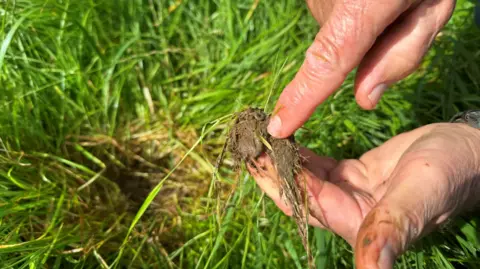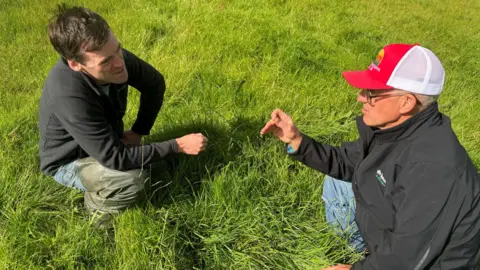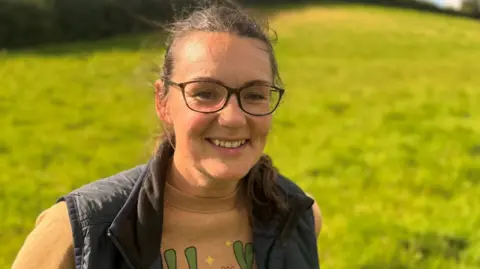The farmers changing how they work to protect the planet
 BBC
BBCCarbon may be a dirty word, but in farming and food terms, it is currency.
It creates life in the soil which translates to nutrition.
As a frontline in the fight against climate change, farmers are being asked to adapt their methods to protect the planet.
Regenerative farming is one system attracting growing attention and hundreds of farmers are expected to discuss and learn about it at the Fields Good conference in Glenarm on Saturday.
Missouri rancher Greg Judy who will be speaking at the event has changed how he describes his work in the American Midwest.
"I used to call myself a grass farmer - I'm not a grass farmer, I'm a microbe farmer," he said as he searched the soil on Will Fraser's Cullybackey farm for worm manure.
"Conventional agriculture, you use a lot of inputs – nitrogen, fertiliser, phosphorus.
"We don't use any of that stuff."
Instead, he rotates his cattle from one area to another up to three times a day.
That means the grass is always regenerating, animals are feeding on long diverse growth and the soil is filled with earthworms - and their poo.

As a relative newcomer to the regenerative approach, Will Fraser was inspired by an oak tree which is dead and worn away where it faces into a field.
It's a reminder to him of the impact of how the farm was run before he took it over three years ago, when cattle were put out for a set period of months.
"In bad weather, they all camped around the tree," he said.
"That's where compaction has damaged the roots, there was over-fertilisation around the base of basically an ancient tree which has led to that big dead branch sticking out."
Too much fertiliser - whether organic or not - can be harmful to plants.
He now rotates his livestock so they no longer have the opportunity to gather round any particular spot.
A 'no brainer' and a 'win-win'
And he concentrates on building diversity in his grass to encourage the worms and other bugs in the soil, an approach he describes as "a no-brainer".
"We've got so much risk in our system, particularly from a climate and weather point of view, we need to get a much more resilient soil and pasture base from which to work," he said.
"We need to be building a system which can cope with the weather we're getting - the cold springs, the wet summers - where we can get animals out and get them performing off grass.
"We've got a long way to go but we're making the first baby steps in the right direction, we're able to save costs and hopefully build resilience in terms of how long we can keep stock out and how much feeding value they're getting from the system."
While Will acknowledges it's not for everyone, he believes it's a "win-win" for many.
For Fields Good organiser Bronagh O'Kane, it is an approach that should get more support.
"This isn't a fad, this isn't a trend, it is happening worldwide," she said.
"The tricky part is the transition and it’ll be different for every system, but we really need the government to step up and come up with some good plans to help us transition.
"It's already a difficult industry as it is, to make good margins in and so to ask us all to go beyond, we need help and that's a big ask."

For Greg, who has been visiting Northern Ireland farms ahead of the convention, a shift in focus is the goal rather than wholesale change.
"The type of grazing we do, it's very environmentally friendly, it's wildlife-friendly, it'll help heal the water cycle," he said.
"Bare soil is death.
"The cow - that same tool that was used to destroy the American West and turned it into a desert because of overgrazing - the same tool can be used to regenerate the soil.
"It's not the cow, it's the how."
